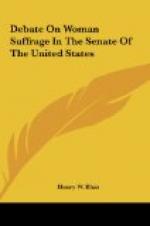If, instead of trying to grasp more material power, women would pursue those studies and investigations which tend to make them familiar with what science teaches concerning the influence of the mother and the home upon the child; of how completely the Creator in giving the genesis of the human race into the hands of woman has made her not only capable of, but responsible for, the regeneration of the world; if they would reflect that nature by making man the bond slave of his passions has put the lever into the hands of woman by which she can control him, and if they would learn to use these powers, not as bad women do for vile and selfish ends, but as the mothers of the race ought, for pure, holy, and redemptive purposes, then would the sphere of women be enlarged to some purpose; the atmosphere of the home would be purified and vitalized, and the work of redeeming man from his vices would be hopefully begun.
The following thoughts are also from the same source: Is this emancipation of woman, if that is the proper phrase for it, a final end, or only the means to an end? Are women to be as the outcome of it emancipated from their world-old sphere of marriage and motherhood, and control of the moral and spiritual destinies of the race, or are they to be emancipated, in order to the proper fulfillment of these functions? It would seem that most of the advanced women of the day would answer the first of these questions affirmatively. Women, I think it has been authoritatively stated, are to be emancipated in order that they may become fully developed human beings, something broader and stronger, something higher and finer, more delicate, more aesthetic, more generally rarefied and sublimated than the old-fashioned type of womanhood, the wife and the mother.
And the result of the woman movement seems more or less in a line thus far with this theoretic aim. Of advanced women a less proportion are inclined to marry than of the old-fashioned type; of those who do marry a great proportion are restless in marriage bonds or seek release from them, while of those who do remain in married life many bear no children, and few, indeed, become mothers of large families. The woman’s vitality is concentrated in the brain and fructifies more in intellectual than in physical forms.
Now, women who do not marry are one of two things; either they belong to a class which we shrink from naming or they become old maids.
An old maid may be in herself a very useful and commendable person and a valuable member of society; many are all this. But she has still this sad drawback, she can not perpetuate herself; and since all history and observation go to prove that the great final end of creation, whatever it may be, can only be achieved through the perpetuity and increasing progress of the race, it follows that unmarried woman is not the most necessary, the indispensable type of woman. If there were no other class of females left upon the earth but the women who do not bear children, then the world would be a failure, creation would be nonplussed.




